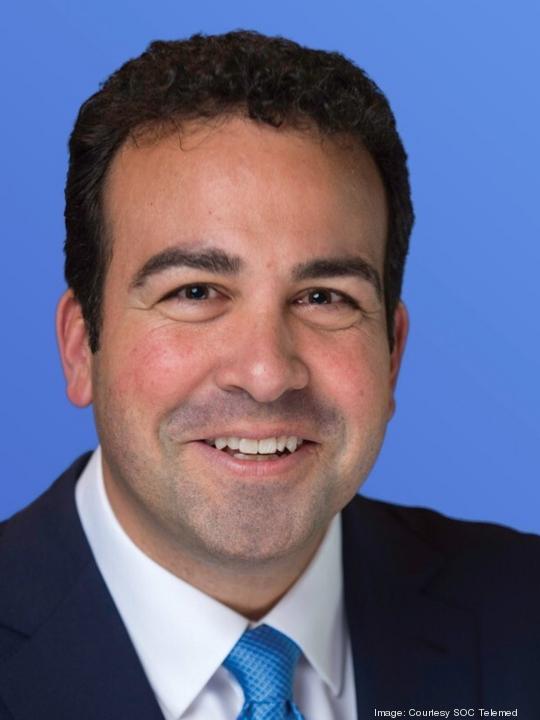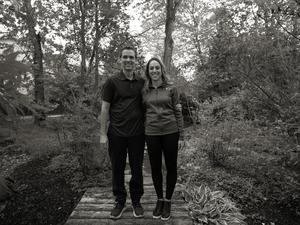
Coronavirus made 2020 the year of the pivot.
But the D.C.-area ventures having real, direct impact on the Covid-19 crisis have done more than tweak their business models; they’re innovating, persevering and committing to getting us through the pandemic in one piece.
They’re laying groundwork and executing on plans to tackle the disease. They’re developing resources and launching initiatives to serve our communities, as we grapple with dangerous and disruptive ripple effects born from the public health emergency. They’re conducting research, donating dollars and delivering on their promises, all with one goal: to push through this period and make life easier in the interim, and thereafter.
They’re all acting with doggedness and drive — qualities that, though always necessary for entrepreneurs and executives, are especially crucial in today’s economy, local leaders say.
“This year has magnified everything that’s always required to create a successful business,” Halcyon CEO Kate Goodall said during a recent panel talk about the region’s innovation economy. “You’ve got to be able to show revenue despite Covid, and I think a lot of companies are staying afloat right now because they were smart, they cut costs, they managed to make some smart pivots.
And these players are not only moving forward, but hitting the gas while staying in their lanes. They’re what we call crisis innovators.
JoinMyPod.org
Months after coronavirus cut the academic year short, many schools are looking at another remote semester heading into the fall. For parents, it’s creating a new wave of challenges.
That’s why D.C. software firm MassLight has rolled out JoinMyPod.org, helping parents form groups for childcare and support for students.
MassLight CEO Daniel Abrams’ young twins were set to start at Marie Reed Elementary in Adams Morgan this fall. And after suspecting the school might move to a distance learning environment for this year, “the idea of wrangling a pair of 3-year-olds into a virtual classroom was weighing on me,” he said. “I knew other parents had the same fears and I'd seen a lot of parents organizing private pods. I really wanted a solution that was open to anyone.”
Last week the new service went live, free to the community and funded by MassLight, which expects about $10 million in 2020 revenue, Abrams said. The business, whose model involves building apps for startup founders in exchange for equity, set aside a five-person team of its 50-person workforce to focus on the new project “like we would any other startup,” he said. The company is also hiring, both for JoinMyPod.org and the larger organization.
“The response has been completely overwhelming,” Abrams said. “We started with a soft launch among friends, but that small group shared the site so widely, we had to spend the first couple days scrambling to increase capacity.”
How does it work? Parents can form small groups within their schools, or join existing “pods,” as they’re called. The platform itself allows them to coordinate schedules and responsibilities as their kids go through school both from home and in-person.
“It's a fine time to consider launching a startup,” Abrams said. “The shift to remote work and telemedicine opened new opportunities that didn’t exist before.”
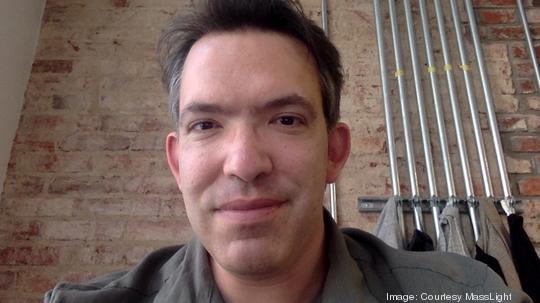
Altimmune
The D.C. region has a strong contingent of biotechs competing in the race to find a Covid-19 vaccine. And one of those players is not planning to win, but to have a successful performance.
Gaithersburg’s Altimmune Inc. is developing both a vaccine candidate for the virus and a treatment for patients in the disease’s early stages, to help prevent hospitalizations and severe cases — and, potentially, prevent this coronavirus and others.
To advance both programs, the Maryland company is tapping industry partners, raising funding and building out its R&D capacity — while, too, juggling its existing pipeline.
It also means taking a different approach; Altimmune’s Covid-19 vaccine candidate is administered via nose spray as are its other vaccines, rather than via a shot in the arm, for instance. And that’s because the companies developing Covid-19 vaccines started with what they knew, which generally involves intramuscular injections, said Dr. Vipin Garg, president and CEO of Altimmune. “We think over time, people are going to realize that… nasal spray would be the right way to deal with this virus and I think our data would really establish that.”
To progress that vaccine through clinical trials, Altimmune has teamed up with Rockville’s Vigene Biosciences. The partners plan to launch an early-stage study in Q4. Altimmune is also working with two other large manufacturers, shooting to deliver 200 million doses in the second half of next year.
The company doesn’t expect to be first to the finish line, as biotechs like Moderna and its Gaithersburg neighbor, Novavax, are further along. And, Garg said, that’s just fine.
“We just know so little about this virus at this point that we can’t declare victory after the first vaccine candidate,” he said. “We have to let it play out so we can have the best, most optimal vaccine candidate to fight this pandemic.”
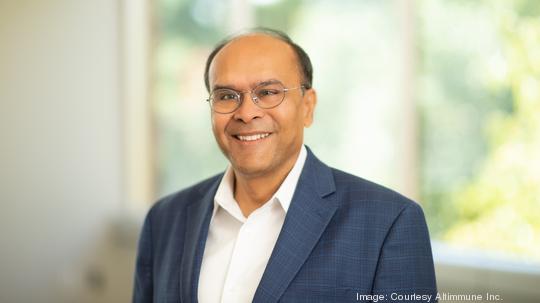
CertifiKid
Potomac-based family deals company CertifiKid LLC has been around for a decade, building its brand and serving the D.C.-area community with discounts on kid-friendly activities and events.
Then the pandemic threatened the business, as well as those with which it has partnered for its vouchers. It also heightened demand for resources for parents — to both navigate the new normal and find safe activities to keep their families occupied. That drove CertifiKid’s husband-wife founders, Jamie and Brian Ratner, to focus on at-home experiences, such as virtual birthday parties; social-distanced outings like drive-in movie theaters and remote vacations; and Covid-related products such as personalized face masks.
Then CertifiKid’s owners made a bold move with the acquisition of New York-based Macaroni Kid, a family-owned digital media brand focused on children’s activities. The deal doubles the local company’s size, catapults it into more markets across the country and accelerates its ability to serve its customers, Brian said.
The transaction was attractive for the local business because Macaroni Kid has “this amazing legacy and community,” Brian said, “and we are going to do our best and give it our all to really build on that legacy, and help grow it and put more fuel on the fire to help it as a whole.”
The agreement opens more doors on a national level, Jamie said, with about 500 hyperlocal newsletters run by independent publishers throughout the U.S. Those writers (essentially mom, dad and grandparent “influencers”) also have the experience to market deals in their communities. That will be important, she said, when demand restores to pre-coronavirus levels, to reach its demographic more effectively and offer deals in those markets.
The Ratners launched their business in 2010, landed a deal with celebrity investor Kevin O’Leary on ABC’s “Shark Tank” in 2019 and launched a national expansion in January.
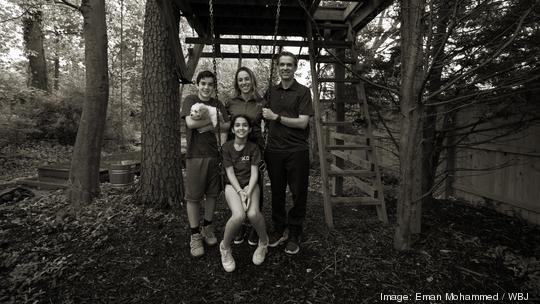
Virginia 30 Day Fund
A local grassroots effort to provide grants to small businesses kicked off in April for a month — or, at least, that was the plan.
The Virginia 30 Day Fund, the brainchild of Disruptor Capital CEO Pete Snyder and his wife, Burson, continues doling out $3,000 forgivable loans to small businesses awaiting federal assistance while feeling the effects of the pandemic.
“Unfortunately, over the past few months we saw mass systems failure at every level of government and most small businesses we’ve encountered didn’t received any governmental help at all,” Snyder said. “These are the folks who don’t have expensive accountants, attorneys and consultants to help them get to the front of the line on PPP and SBA loans. These are the folks who are for lack of a better term ‘caught in between the couch cushions’ during this horrible time. So, we had to step up and stick around to help those in need.”
The model invites grant recipients to pay it forward when they can. And two have already done that: Alexandria’s Six Half Dozen Design Studio, which gave funding to neighbor Old Town Deli, and Nelson Dental Practice dental practice in Manassas, which gave funds to the nearby Rangoli Indian Restaurant.
To date, the fund has raised more than $3.1 million and, of that, given out $1.86 million for 620 small businesses, Snyder said, adding that there’s much more to do. Because many of the region’s schools remain closed this fall and businesses continue to struggle, he said, the fund plans to stay in the game, to try to help “save hundreds of more companies in the weeks ahead, and hopefully thousands of more jobs.”
It’s also gaining traction beyond Virginia. The model has been replicated in Georgia, New Jersey, Arkansas, Mississippi and Pennsylvania — where it has funded more than 500 companies so far, Snyder said. The local effort has received interest from national brands looking to get involved.
But sometime before the end of the year, the 30 Day Fund will wind down and become the Pay It Forward Foundation. That organization will serve to manage the businesses looking to pay it forward themselves, Snyder said, “and redirect those funds to struggling small businesses in need.”

SOC Telemed
Coronavirus forced the region’s health care providers to change the way they deliver care, shifting to telemedicine overnight and continuing to use virtual platforms to manage patients.
The company started 2020 with $15 million in fresh funding, and plans to reach more patients and health systems. Then the pandemic changed the industry, requiring SOC to grow its customer base, bulk up its team and expand its services — by both making its specialists available to patients, and providing its software platform to hospitals to use with their patients.
“Sometimes, changes in the health care system happen slowly for good reasons; there are complex protocols and procedures in place and they evolve slowly, but occasionally, there’s a precipitating event that causes change to happen more rapidly, and this is one of those precipitating events,” said SOC interim CEO Paul Ricci in a recent interview. “Covid created a problem on acute-care capacity management, it’s created problems with physician shortages and it’s put enormous cost pressures on the hospital systems — and SOC addresses all of those issues, and acute-care telemedicine addresses all of those issues — so the adoption and interest in acute-care telemedicine has been significantly boosted by this phenomenon.”
Then the Reston telemedicine provider signed a deal to go public through a merger with a blank-check company, in a transaction that valued the company at about $720 million.
The deal provides SOC with growth capital it needs to keep pace with the fast-growing industry, Ricci said. It also brought on board HCMC’s health care leadership to make it a stronger organization.
SOC — a 2020 Inno on Fire winner — already focuses on neurology, psychiatry and critical care. It also expects to break into cardiology, infectious disease, hospital medicine, emergency medicine, maternal-fetal medicine, palliative care and oncology going forward.
Founded in 2004 as Specialists on Call, SOC now serves 847 provider facilities, including 543 acute-care hospitals, spanning 47 states. The company said it has provided 1 million acute-care consultations to patients.
